Anorexia
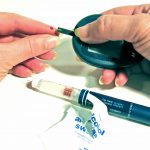
Because both diabetes and anorexia involve body issues, weight management and food control, some people develop a pattern in which they justify or veil anorexia with diabetes. In fact, some clinicians believe that eating disorders are more common in those with diabetes than the rest of the population. The consequences of diabetes and anorexia can …
Read More
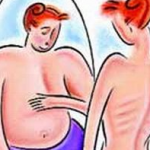
People with anorexia often misjudge the size of their own bodies, believing themselves to be much fatter than they are. However, according to a new study in France, they accurately perceive other people’s body sizes. The study required normal weight and anorexic participants to judge their own size by asking them whether or not they …
Read More

Anorexia nervosa is a type of eating disorder that may initially be hard to spot. In general, anorexics tend to be skilled at hiding their behavior and may seem – on the outside – like healthy and happy individuals. Warning signs are typically present, however, and with proper intervention, better outcomes can be achieved. Emotional …
Read More
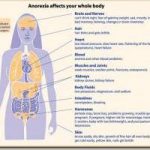
Approximately 24 million people in the United States suffer from an eating disorder, according to the National Association of Anorexia Nervosa and Associated Disorders. One of the three most common eating disorders is anorexia, which can be deadly if left untreated. Startling Anorexia Statistics • People who suffer from anorexia see themselves as overweight when, …
Read More
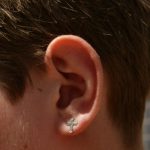
One of the common symptoms of anorexia is a thing called lanugo – a condition characterized by excessive hair growth in certain areas of the body. Lanugo is actually a sign that the body is trying to protect itself during the starvation process by trapping in heat that muscles and fat can no longer provide. …
Read More
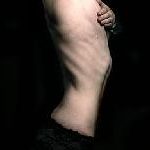
Eating disorders where the primary outcome is a failure to take in proper nutrition will result in an emaciated, starved look, excessive fatigue, hormonal changes, and eventually, death. The classic anorexic nervosa patient pursues thinness relentlessly. They have a distorted body image and, while their weight is obviously lower than normal, they do not see …
Read More

Eating disorders are common illnesses that cause serious issues with a person’s diet on a daily basis, including eating too little or too much. Anorexia, also referred to as anorexia nervosa, is one of the three most common types of eating disorders. Anorexia is a very serious mental illness in that people with the disorder …
Read More
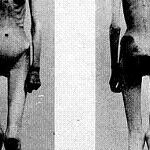
Anorexia means “not eating.” The eating disorder where people willfully stop eating (instead of from a surgery or cancer or other physical illness) is properly called anorexia nervosa. The “nervosa” part refers to the psychological basis. It’s also not necessarily about starving oneself. Excessive exercise, laxatives and other measure can be used so that even …
Read More

Eating disorders come with a variety of physical side effects, and the most visible changes often occur in the health of the skin, hair and nails. The longer an eating disorder persists, the harder it may be to restore natural hair growth patterns – while hair loss may occur on the head, hair growth is …
Read More

There are two primary types of eating disorders, anorexia and bulimia and both have horrible consequences. It’s common knowledge that many young women experience the significant health issues that an eating disorder can cause. It is very important to equip physicians with practical methods for screening to see if people suffering from these disorders and …
Read More
 Eating Disorder Self Test. Take the EAT-26 self test to see if you might have eating disorder symptoms that might require professional evaluation. All answers are confidential.
Eating Disorder Self Test. Take the EAT-26 self test to see if you might have eating disorder symptoms that might require professional evaluation. All answers are confidential.
Find a Treatment Facility Near You
Click on a state below to find eating disorder treatment options that could be right for you.










 Eating Disorder Self Test. Take the EAT-26 self test to see if you might have eating disorder symptoms that might require professional evaluation. All answers are confidential.
Eating Disorder Self Test. Take the EAT-26 self test to see if you might have eating disorder symptoms that might require professional evaluation. All answers are confidential.